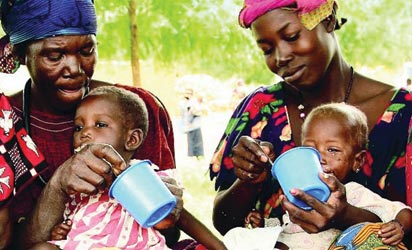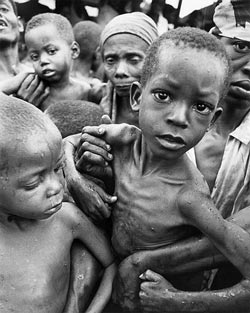Hunger in Nigeria: Calling for Strategic Focus of International Development Aids
Jan 21, 2015
Story


In 2003, the wife of my cousin died at child birth. Doctors traced the death to hunger related complications. The baby also died. Her four surviving children were malnourished and sick. It was an intervention of intense food supplementing that revived the four kids.
Though the US government currently supports many development needs including health, education, HIV/AIDS, economic growth, environmental protection, and democratic governance in Nigeria, hunger eradication should be made its top development investment. Failing to address-and prioritize-hunger is a strategic mistake as the devastating effects of hunger leave Nigerians vulnerable to the point that other US aid efforts are rendered less-effective. Hunger is the first problem faced by the very people US strives to help through its generous supports.
The Global Hunger Index (GHI) reports that about 40 percent of Nigerian children under age five are stunted in their growth, nine percent are wasted (have low weight given their height) and 25 percent are underweight, all due to hunger. It further shows that two out of every five children in Nigeria are chronically underfed. As a country, Nigeria ranks in the GHI’s top 20 nations most ravaged by hunger, accounting for 5.7 percent of hunger problems in the world. The report also shows that Nigeria is making slow progress in meeting the Millennium Development Goal targets on reducing the incidence of hunger by half by the year 2015. In sum, we know that hunger in Nigeria remains at a level categorized as “serious,” wreaking devastating effects on Nigerians, especially the women and children who are often marginalized in families and societies dominated by men.
The right to food is basic and non-negotiable. This implies that the state has an obligation to provide and protect citizens’ access to adequate food. This obligation has not been met in Nigeria. Statistics available show that about 65 percent Nigerians have insufficient access to the amount of food required to keep them healthy and fit to embrace activities for the nation’s development. This is mainly due to price spikes and excessive food price volatility, two concerns which disproportionately affect poor and hungry people. This is an issue begging for concern and urgent attention from any international development aid agency interested in Nigeria.
We also know that hunger is a critical risk factor contributing to myriad of other social problems, including those the US has sought to address in Nigeria. For instance, medical scientists including Kadiyala S. and others in ‘Rethinking food aid to fight HIV/AIDS,’ presented during the Washington DC Food Consumption and Nutrition Division Discussion, stated that undernourished people infected with HIV/AIDS develop the full symptoms of the disease more quickly than people who are well-fed. Again the Food and Agricultural Organization stated that peoples’ learning ability is always compromised by hunger. This supports the argument that intelligent quotients for children and adults who are well-fed are always higher than those who are hungry. Intellectually and physically, people perform better and are more resilient to disease when they feed well.
The US has a distinct opportunity to increase efficacy of all its aid projects in Nigeria by addressing hunger first. Intense anti-hunger activities are capable of improving Nigerians’ life in many ways and, consequently, positively impact other development goals around health, education, and HIV/AIDS. Indeed, Nigeria cannot sustainably establish reasonable health and education services, good governance, stability, and economic growth while hunger is so badly affecting the people who are supposed to be beneficiaries of such development projects.
The World Food Program states that one out of seven people from the developing world go to bed hungry. Nigeria is an emerging democracy with a teeming population of about 140 million, a large proportion of whom face hunger each night. The US, a world superpower and a great force advocating for positive change in Nigeria; will improve the efficacy and impact of its development efforts in this country by addressing hunger first. As a witness to the effects of hunger in my country—and in my own family—I urge the US to re-prioritize its efforts to support anti-hunger projects. Consider the learning abilities of hunger-ravaged children. Consider the amount of impact HIV care program will have on individuals’ non-boosted immune system.
This article is part of a writing assignment for Voices of Our Future a program of World Pulse that provides rigorous new media and citizen journalism training for grassroots women leaders. World Pulse lifts and unites the voices of women from some of the most unheard regions of the world.




